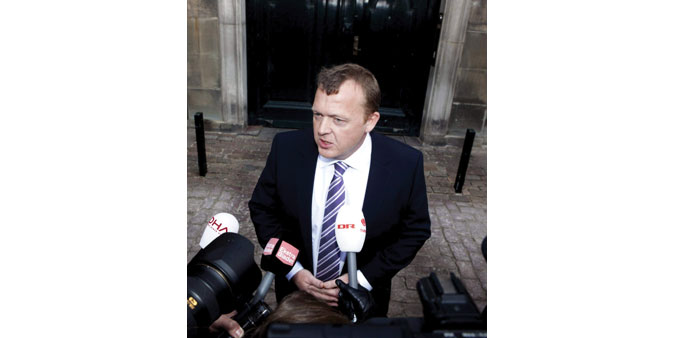Reuters
Copenhagen
Denmark’s new prime minister, Lars Lokke Rasmussen, said yesterday that he was bringing forward the date of a referendum on whether the country should give up its exemption from European Union justice rules, a move strongly opposed by eurosceptics.
The vote was due by March 2016 but will now take place before the end of this year.
That will pose an early test of Rasmussen’s authority as his Liberals heads a new minority government despite holding just 34 of parliament’s 179 seats.
Denmark needs to adopt the justice rules, from which it has been exempt since 1992, in order to continue participating in the EU-wide police agency Europol.
“It will be this year because it’s super-important for us to keep close to the core of European co-operation,” Rasmussen told reporters, explaining the change of timing.
The vote will be closely watched across the EU, especially as a prelude to Britain’s attempt to renegotiate the terms of its membership and hold a referendum by the end of 2017 on whether to stay in the 28-nation bloc.
Rasmussen’s pro-EU comment marked a contrast with eurosceptic notes he struck during the recent election campaign in a bid, political observers said, to keep close to the right-wing Danish People’s Party (DF).
He was speaking after a ceremony in which he took over the prime minister’s office from Social Democrat Helle Thorning-Schmidt after her centre-left bloc lost this month’s election.
Rasmussen’s Liberals had been widely expected to form a coalition government with DF, a formerly fringe party that soared to become the largest faction on the right in parliament.
But DF had refused to back down on its demands which included a referendum on whether Denmark should remain in the EU.
DF is widely expected to run a vociferous “No” campaign in any referendum, as opting in would represent giving away sovereignty to Brussels.
It does not want to exit the EU but it does want reforms, similar to those sought by British Prime Minister David Cameron to claw back sovereignty in some areas.
In particular it wants Denmark to retain control over aspects of immigration policy, which it said would be at risk if Denmark opts into the justice rules.

Rasmussen: The referendum will take place this year.
